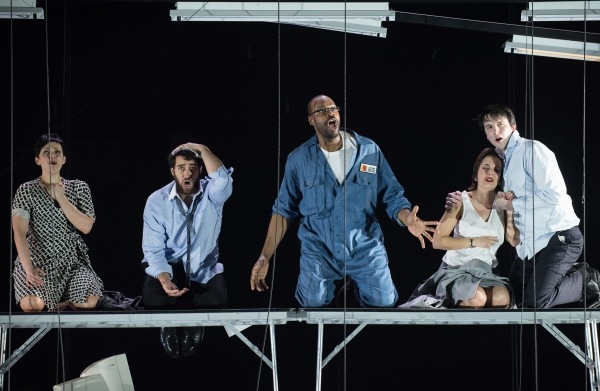Between Worlds (Barbican Theatre)

© Hugo Glendinning
After a frustrating day it’s a good sign when you sit down to watch an earnest new opera on a dark contemporary subject and find yourself gripped and moved, which is what happened to me at ENO’s Between Worlds.
Too early for a 9/11 opera? Rubbish. If RC Sherriff had been that fastidious we’d never have had Journey’s End. The only questions to be asked about this ambitious work by Tansy Davies and Nick Drake are first: does it honour its subject, and second: is it any good? The answer to both is yes, but with reservations.
Most of the latter arise from Drake’s libretto, which is a poor effort hamstrung by its own literalism. He takes a cluster of archetypal Americans, places them together in one of the Twin Towers and precipitates their end via scraps of clumsy narrative. "I am a leaf on a tree in the trembling wind when the leaf shows silver" soliloquises one victim, moments before asking somebody to "Find out what the fuck’s happening". Later, when one of them sings "We’re going to get out of this, you hear me?", the urge to cry "Hell, yes" is irresistible.
The text’s biggest sin is to be out of step with Davies’s music, a distinguished 80-minute score by a young composer whose style, at once stark and beautiful, bespeaks a genuine operatic voice. I hope she hangs in there; her country needs her. Airy textures rise with imaginative economy from a pint-sized ENO Orchestra that’s tightly conducted by Gerry Cornelius, and the opera’s verbal poverty is swept away by her dramatic colouring. Late on, after the devastation, a virtuosic sequence where fleeting high-note figures flutter like debris above sustained low basses strikes me as music of the highest order.
Happily, Deborah Warner‘s production is more in sympathy with Davies than with Drake, so naturalism is out of the question. The central level of Michael Levine‘s three-tier set represents a floor high up within the building itself, while ground level is reserved for those left behind. Above them an all-seeing ‘Shaman’ presides throughout, stunningly sung by Andrew Watts who dips from his habitual countertenor register into chest-voice baritone to create some startling vocal effects.
Well-defined individual voices emerge sporadically from the excellent choral ensemble, while a dozen or more named characters are played with uniform excellence and commitment by the likes of Rhian Lois, Clare Presland, Phillip Rhodes and William Morgan. Baritone Eric Greene is especially impressive as the lowly janitor who emerges as the wisest voice among the victims. Susan Bickley contributes a predictably powerful cameo as the mother of one of them, a soul whose rose-pruning is interrupted by the dread of being warned by her own doomed child not to turn on the television.
Do the towers collapse? They do, as they probably had to, but it’s a horror that’s achieved through nothing more substantial than myriad sheets of office paper. The accompanying sounds from the pit are similarly restrained: there’s no mighty crash, just instrumental eeriness and a sickening silence.










